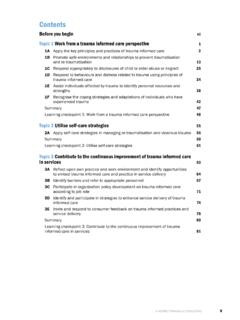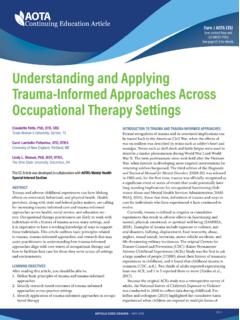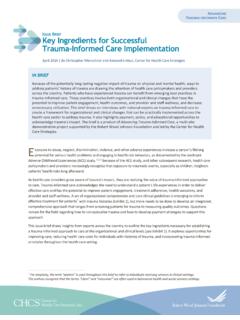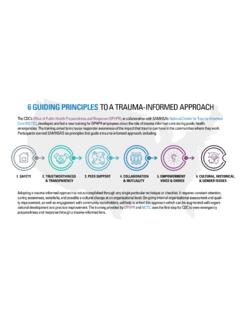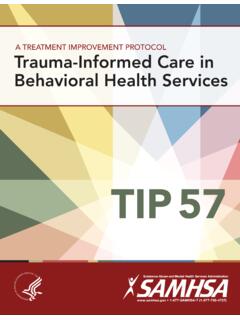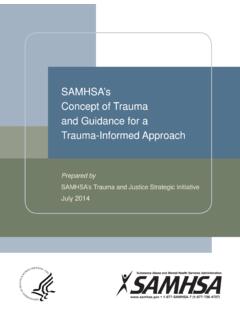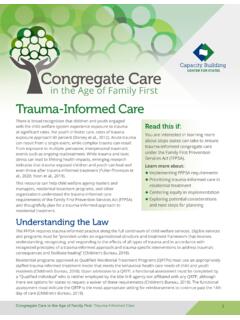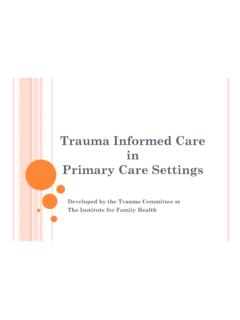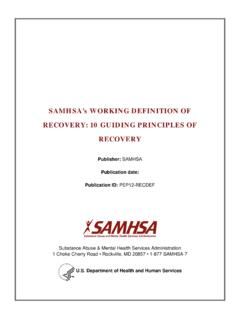Transcription of Principles for Trauma Informed Practice
1 Principles for Trauma Informed PracticeBristol, North Somerset & South Gloucestershire2 AcknowledgementsThe information in this document was developed in collaboration with people with lived experience. With thanks to: Tavoy, Abdi and Peter for their contributions as members of the Bristol Belonging Strategy Youth Consultation Team, to Mallika and Tom from Independent Futures (IF Group), and to Sam and Justine from the Independent Mental Health Network (IMHN). We would also like to thank staff, managers, clinicians and academics from a variety of organisations who were also involved.
2 We are very grateful for their time, input and feedback. Living document This is designed to be a living document and we welcome any feedback. We have also developed a Knowledge and Skills Framework and an Implementation Toolkit to help you and your organisations embed Trauma Informed Practice in your daily work. All of these documents are available to download here: collective understanding of adversity and Trauma , including ACEs, is constantly evolving, and this document is designed to be developed alongside this ever-growing body of evidence.
3 If you have any feedback on either this document, the Knowledge & Skills Framework or the accompanying Implementation Toolkit, please email us at: document is version 1, published March 20213 Adversity & Trauma Informed PracticeTrauma Informed approaches recognise the prevalence of Trauma in people s lives and acknowledge the potential effects that this can have on individuals and their families, networks and communities. They are non-labelling, respectful and hopeful approaches that recognise people s strengths and resilience and their potential for healing.
4 They also recognise how service responses can be helpful for people, while also having the potential to be re-traumatising. Trauma Informed approaches are increasingly being used across a variety of organisations, including hospitals, schools and residential settings, and in health, primary care, disability, homelessness, mental health and young people s services. These may be Trauma Informed approaches (focuses on whole workforce development) and/or Trauma Specific, where the service provides therapeutic clinical support to support the healing of Trauma .
5 Although much of this work originates from America, Australia, Canada and New Zealand, interest and Practice in this area is growing at a steady rate within the UK, with NHS Scotland and Youth Justice services in Wales at the forefront. In addition, high profile situations, the work of campaigners, and the current Covid-19 pandemic, has also meant that Trauma -related topics are beginning to be talked about in the media more frequently. There are currently several descriptions of Trauma and for the purposes of the information here, the following definition is used: Individual Trauma results from an event, series of events, or set of circumstances that is experienced by an individual as physically of emotionally harmful or life threatening and that has lasting adverse effects of the individual s functioning and mental, physical, social, emotional, or spiritual wellbeing.
6 Substance Abuse and Mental Health Services (SAMHSA, 2014a) Adversity is also included as an important aspect of the work being developed locally, as people with lived experience described how some people may not recognise their experiences as being linked to Trauma . They also felt that some people might not have heard of the term Trauma , that this word may hold no meaning for them, or that linking their situations to Trauma could result in their experiences feeling more real and difficult to overcome. Language is seen as being really important by everyone involved in this project and the importance of any terms used being inclusive.
7 Including adversity is also a reminder that adverse experiences can be stressful and potentially traumatic, as can the absence of appropriate care ( neglect). It also relates to the origin of much of this work, which is based on previous research on Adverse Childhood Experiences (ACEs).4 Adversity & Trauma Informed Organisations4 key assumptions For services to experience whole system and cultural change, the Substance Abuse and Mental Health Services Administration (SAMHSA, 2014a) proposes that 4 key assumptions are needed in addition to having a set of Principles to work towards.
8 The local working group felt that that whole system change was really important for Adversity and Trauma Informed approaches to be embedded in a meaningful way and so wanted to subscribe to the following assumptions as a result. According to SAMHSA (2014a) a programme, organisation or system that is Trauma Informed : Realises the widespread impact of Trauma & understands potential paths for recovery Recognises the signs & symptoms of Trauma in the people that they serve & in their families, staff & others involved with the system Resists re-traumatisation (actively seeks to resist this) Responds by fully integrating knowledge about Trauma into policies, procedures & assumptions relate to all visitors, peers, volunteers and staff involved with the organisation regardless of role and to all areas of the organisation s work.
9 They also require agreement and sign up at all levels of staffing in order to be & Trauma Informed PrinciplesThe following Principles were developed through discussions with people with lived experience, with input from staff and clinicians and through drawing on Adversity and Trauma Informed literature (SAMHSA, 2014a, & Chart by the Institute on Trauma and Trauma - Informed Care (ITTIC), 2015) to create the current version of the Principles below. SafetyOrganisations provide a supportive, safe & nurturing environment for everyone that accesses it & promotes physical, emotional & psychological safety.
10 All areas are welcoming, privacy is respected & there is a focus on every interaction creating a sense of & ClarityPeople have choice & control. Individuals, families, friends, carers & staff are given clear & appropriate messages about their rights & are made with people & not for them & power is shared wherever are invited to help design, develop, deliver & evaluate services in a meaningful seek to build trust through being consistent & reliable & through healthy & respectful interpersonal strengths, skills & resilience are recognised & organisations believe in & cultivate people s empowerment & resilience.
